 Still in beta but already a big hit in the Digital Lifestyles office is the Walkit.com website, a mapping site designed for perambulating pedestrians keen to do their bit to fight global warming.
Still in beta but already a big hit in the Digital Lifestyles office is the Walkit.com website, a mapping site designed for perambulating pedestrians keen to do their bit to fight global warming.
Currently covering a large chunk of London, the site helps walkers plot cross-town journeys in a similar fashion to London Transport’s Journey Planner.
Users simply type in the postcode or street name of their start and end points and a zoomable street map (based on Streetmap.com) is generated, with the walking route clearly marked in blue.
If the user hasn’t been specific enough with their addresses, the interface offers up a list of more precise locations, including road intersections.
Burning the lard
Once you’ve generated your walking map, an information strip tells you the total distance and how long it would take to complete the journey at slow/medium/fast walking rates.
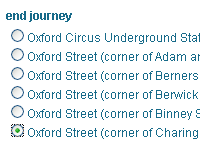 Folks still battling a post-Christmas beast of a belly might find the column displaying how many calories you might expect to burn depending on fast you’re shuffling along useful.
Folks still battling a post-Christmas beast of a belly might find the column displaying how many calories you might expect to burn depending on fast you’re shuffling along useful.
According to their data, a fast walk from Brixton to Oxford Street would take 65 minutes and burn 347 calories – less than the calories in the two pints of Stella we’d need to drink to recover.
‘The Good Life’-loving, Tom and Barbara types can also feel extra smug checking out the ‘Co2 avoided’ column, which lists how much carbon dioxide the same journey would have created by car, taxi or bus instead.
Nearby tube and rail stations are also included onscreen as well as options to print the map, print or view written directions and email the route to a friend.
Clicking on the written directions automatically centres the map on that location, which is rather a nice touch.
Currently the system only produces the most direct route, rather than the ‘nicest’ route and the tech bods at walkit are looking into ways to include some pedestrian-only routes across parks, by rivers etc.
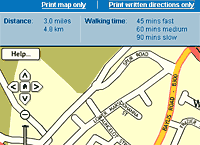 Another thing missing is the ability to plot routes involving multiple points: it would be great to plan an afternoon’s walking and have an instant readout of the miles walked and calories burned – and if there was a version that could be carried around on our Palm Treo, all the better!
Another thing missing is the ability to plot routes involving multiple points: it would be great to plan an afternoon’s walking and have an instant readout of the miles walked and calories burned – and if there was a version that could be carried around on our Palm Treo, all the better!
Ken don’t care
Launched by a “tiny outfit” motivated by a desire to get more people walking, the walkit.com team deserve all the support you get, and with their much-publicised green agenda, you’d think ol’ Ken Livingstone, Transport for London and the Labour spin team would be scrambling to get onboard.
Sadly, that doesn’t seem to be the case with a faceless ‘Senior Customer Services Adviser’ at TfL only commenting that it would be, “counter-productive to invest public money in another journey planning tool specifically for walking”.
www.walkit.com
 The integration between YouTube and Google is becoming ever-stronger.
The integration between YouTube and Google is becoming ever-stronger.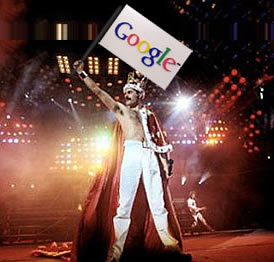 Just when Microsoft was developing as bit of a confident man-about-town swagger about its rising search engine performance, a new report from Nielsen/NetRatings delivers a humbling slapdown in the goolies.
Just when Microsoft was developing as bit of a confident man-about-town swagger about its rising search engine performance, a new report from Nielsen/NetRatings delivers a humbling slapdown in the goolies.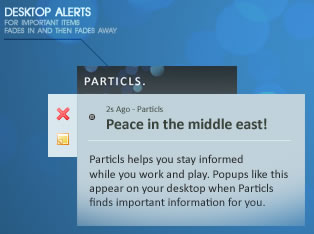 Information overload is a buzz phrase which has been getting a lot of use recently. It refers to the enormous amount of information which we now consume (largely because of the level of accessibility to content which the Internet gives us), and the challenges that that creates. Another important issue is the Long Tail, as recognised by Chris Anderson, and the way that relates to content. In other words, there is now far more information available which makes discoverability much harder.
Information overload is a buzz phrase which has been getting a lot of use recently. It refers to the enormous amount of information which we now consume (largely because of the level of accessibility to content which the Internet gives us), and the challenges that that creates. Another important issue is the Long Tail, as recognised by Chris Anderson, and the way that relates to content. In other words, there is now far more information available which makes discoverability much harder. 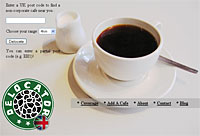 If you travel around the UK a lot and find the homogenisation of High Streets into identical rows of bland coffeeshop multinationals a deeply depressing experience, you may find
If you travel around the UK a lot and find the homogenisation of High Streets into identical rows of bland coffeeshop multinationals a deeply depressing experience, you may find 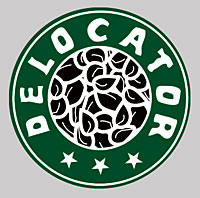 Delocating the world
Delocating the world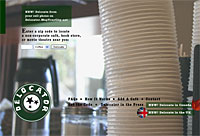 With Starbucks promising to open a new branch
With Starbucks promising to open a new branch 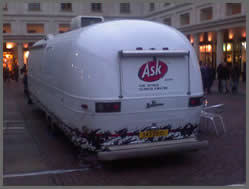 Sitting on the tube, opposite such an ad, I figured that there were only two possible companies which could be accused of controlling 80% of information on the Web; it could plausibly refer to either Internet Explorer’s market share (and would therefore be an advert for Firefox) or Google’s market share. Since I knew Mozilla wasn’t planning any advert like this, I assumed that it was a competitor to Google, and concluded it was probably Ask (since neither Yahoo or Microsoft would manage to think outside the box to such an extent). However, I dismissed that idea instantly as it seemed so unlikely that a well respected company would attempt such a pathetic campaign, and that therefore it must be some new search engine with far too much venture capital. By that point I had lost interest, and began examining the ventilation panel.
Sitting on the tube, opposite such an ad, I figured that there were only two possible companies which could be accused of controlling 80% of information on the Web; it could plausibly refer to either Internet Explorer’s market share (and would therefore be an advert for Firefox) or Google’s market share. Since I knew Mozilla wasn’t planning any advert like this, I assumed that it was a competitor to Google, and concluded it was probably Ask (since neither Yahoo or Microsoft would manage to think outside the box to such an extent). However, I dismissed that idea instantly as it seemed so unlikely that a well respected company would attempt such a pathetic campaign, and that therefore it must be some new search engine with far too much venture capital. By that point I had lost interest, and began examining the ventilation panel.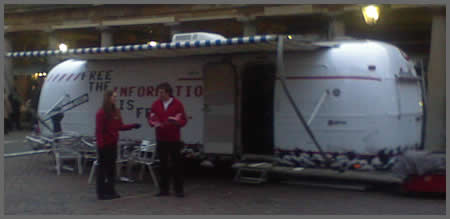
 Still in beta but already a big hit in the Digital Lifestyles office is the Walkit.com website, a mapping site designed for perambulating pedestrians keen to do their bit to fight global warming.
Still in beta but already a big hit in the Digital Lifestyles office is the Walkit.com website, a mapping site designed for perambulating pedestrians keen to do their bit to fight global warming. Folks still battling a post-Christmas beast of a belly might find the column displaying how many calories you might expect to burn depending on fast you’re shuffling along useful.
Folks still battling a post-Christmas beast of a belly might find the column displaying how many calories you might expect to burn depending on fast you’re shuffling along useful. Another thing missing is the ability to plot routes involving multiple points: it would be great to plan an afternoon’s walking and have an instant readout of the miles walked and calories burned – and if there was a version that could be carried around on our Palm Treo, all the better!
Another thing missing is the ability to plot routes involving multiple points: it would be great to plan an afternoon’s walking and have an instant readout of the miles walked and calories burned – and if there was a version that could be carried around on our Palm Treo, all the better!  A new survey has seen Google continuing to exert its dominance on the US web search market, grabbing a huge 47.4 per cent of the sector, up 0.4 per cent during December.
A new survey has seen Google continuing to exert its dominance on the US web search market, grabbing a huge 47.4 per cent of the sector, up 0.4 per cent during December. Also heading downwards was InterActiveCorp’s Ask.com search engine, slipping 0.1 per cent to 5.4 per cent.
Also heading downwards was InterActiveCorp’s Ask.com search engine, slipping 0.1 per cent to 5.4 per cent.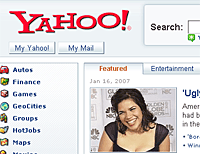 The overall US search market has ballooned by 30 per cent since December of 2005, with comScore reporting that consumers performed 3.2 billion searches on Google sites and 1.9 billion searches on Yahoo!
The overall US search market has ballooned by 30 per cent since December of 2005, with comScore reporting that consumers performed 3.2 billion searches on Google sites and 1.9 billion searches on Yahoo!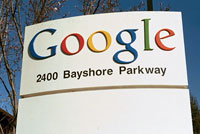 Google is converting its Californian headquarters to run partly on solar power, creating the largest solar installation on any corporate campus in the United States.
Google is converting its Californian headquarters to run partly on solar power, creating the largest solar installation on any corporate campus in the United States.  Google haven’t disclosed the costs of the project, but it’s unlikely to cause much of a dent in the pockets of a company reputed to have nearly $10 billion in the corporate coffers.
Google haven’t disclosed the costs of the project, but it’s unlikely to cause much of a dent in the pockets of a company reputed to have nearly $10 billion in the corporate coffers.  Unhappy with the inaccuracies of the online encyclopaedia he set up, Wikipedia co-founder Larry Sanger has announced that he will be launching an alternative to the free online reference this week.
Unhappy with the inaccuracies of the online encyclopaedia he set up, Wikipedia co-founder Larry Sanger has announced that he will be launching an alternative to the free online reference this week. 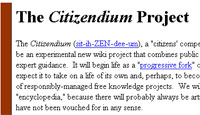 Such is the explosive growth of the site, this figure represents a whopping 162 percent rise from the same period last year.
Such is the explosive growth of the site, this figure represents a whopping 162 percent rise from the same period last year. 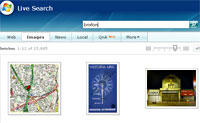 Microsoft is officially launching its updated next-gen, ‘Live Search’, search engine today as the company tries hard to catch up with market leaders Google and Yahoo.
Microsoft is officially launching its updated next-gen, ‘Live Search’, search engine today as the company tries hard to catch up with market leaders Google and Yahoo.  In line with its rivals, Live Search will also feature a new social search service called QnA, where surfers can pose questions and get answers from other users.
In line with its rivals, Live Search will also feature a new social search service called QnA, where surfers can pose questions and get answers from other users. 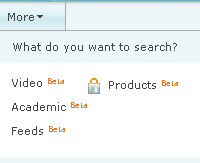 Microsoft’s new search engine – with its Google-a-like super-simple homepage – has been in public beta testing since March at Live.com, which is also shaking off its beta status this week.
Microsoft’s new search engine – with its Google-a-like super-simple homepage – has been in public beta testing since March at Live.com, which is also shaking off its beta status this week.